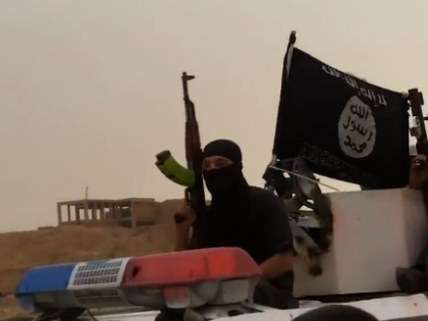Nation Building Isn't Needed to Fight ISIS
The president should focus upon a narrow mission, and resist calls for yet another quixotic crusade in the Middle East.

In his speech to the American people tonight, President Obama aims to build support for a protracted military campaign against the Islamic State in Iraq and Syria (ISIS).
It doesn't have to be a hard sell. A majority of Americans support a military response—though not U.S. troops on the ground. Very few are content with allowing ISIS to spread its influence with impunity, especially after the brutal killing of the American journalists James Foley and Steven Sotloff. The group has effectively declared itself an enemy of the United States, and there is growing support for action against the group before it even attempts an attack on the U.S. homeland (something that it appears only to be aspiring to, as opposed to actively planning for).
But taking the fight to ISIS means going back into Iraq, a country in which now four successive U.S. presidents have taken the nation to war, and the American people are understandably anxious about being sucked back into a seemingly open-ended conflict. Thus, two questions are particularly relevant: First, how large a response is justified? And, second, what end state is acceptable?
The bipartisan Beltway consensus offers up predictable answers to these questions: the response should be massive, and we should be seeking the complete eradication of ISIS as a military and political movement. Indeed, the harshest criticism comes from those who argue that the president isn't doing nearly enough.
In his appearance on NBC's "Meet the Press" over the weekend, President Obama twice assured Americans that he was not contemplating U.S. boots on the ground. But some believe that the president should be preparing Americans for a major operation, one involving potentially many thousands of U.S. troops fighting in Iraq for an indeterminate period of time. Outspoken neoconservative Max Boot estimates that between 10,000 to 15,000 U.S. troops might ultimately be required in Iraq.
One should take such estimates with a large grain of salt. In 2003, Boot claimed that 60,000 to 75,000 U.S. troops could stabilize Iraq, disputing the higher number of 200,000 U.S. troops cited by military planners. A few years later, as Iraq descended into a brutal civil war that claimed over 400,000 lives, Boot was one of the most enthusiastic supporters of a larger U.S. presence there. How much larger? The U.S. troop "surge" topped out at just over 170,000, not counting the many tens of thousands of private security contractors in country. And even that wasn't enough to stabilize Iraq. The hoped-for reconciliation between Sunnis and Shia Arabs never occurred, while the Kurds maintained their autonomy in the north, undermining what little authority the central government in Baghdad ever hoped to have.
Troop numbers are a function of the mission at hand. Ambitious objectives require many resources, and lots of patience. The hawks on both the left and right believe that a large U.S. ground presence is required because they don't want to limit the mission to merely hitting ISIS—they want to restore stability and order in Iraq, exclude Iranian influence from Iraqi politics, and topple Bashar Assad in Syria. In other words, they want us back in the nation-building business, but now in two countries racked by civil war and sectarian hatreds, instead of just one. Their desired end-state appears to be two friendly, liberal democracies in the heart of the Arab world.
By contrast, most Americans support a more achievable end-state—a weakened ISIS that is contained by those who have the most to fear from it. Thus, a wider U.S. war in Iraq is unlikely, and a wider war in Syria even less so. Besides, Barack Obama doesn't appear to want one. Perhaps he has learned from his predecessor's bitter experiences over the past two decades?
Simply put, a full-scale ground war with U.S. troops doing most of the fighting isn't necessary. ISIS currently presents, at worst, a minor and manageable threat to U.S. security. The group has many enemies, and they are growing more determined to resist it by the day. If ISIS expands the territory under its control, it will acquire even more enemies. If it attempts to consolidate control in the territory it already has, it will engender resistance and opposition, as al Qaeda did in western Iraq in 2006.
There is a military mission available—targeted air strikes against ISIS extremists, and military assistance to Kurdish and Iraqi forces taking the fight to them on the ground—that can degrade ISIS's capabilities, and complicate its now very limited ability to attack the United States. The president should focus upon that narrow mission, and resist the calls to launch the U.S. military on yet another quixotic nation-building crusade in the Middle East.


Show Comments (17)